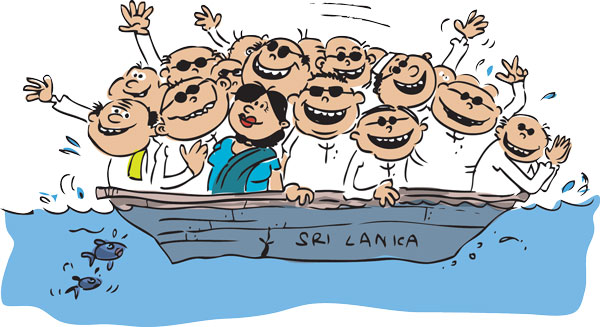Reply To:
Name - Reply Comment
 n the very day last week when we editorially questioned the rationale for having so many ministries for certain sectors in the country, two more deputy ministers were sworn in by President Mahinda Rajapaksa, bringing the number of deputy ministers to 40.
n the very day last week when we editorially questioned the rationale for having so many ministries for certain sectors in the country, two more deputy ministers were sworn in by President Mahinda Rajapaksa, bringing the number of deputy ministers to 40.
Prabha Ganesan once a die-hard Tamil nationalist and hailing from the Indian-origin community in Colombo was appointed Deputy Minister of Telecommunications and Information Technology while P. Digambaram, the leader of the National Union of Workers (NUW) was sworn in as Deputy Minister of National Languages and Social Integration. The NUW formed by V.K.Vellayan, the respected veteran trade unionist too is a political party as well as a trade union representing the Indian-origin community.
Interestingly, the entire country knows, but the leaders and the followers of the ruling coalition do not accept in public that there has not been any need for these appointments. It is also known to everybody that these appointments were prompted by the September 20 Uva Provincial Council elections when a sizable number of voters of Indian origin will use their franchise.
In other words this is nothing other than a psychological bribe to the voters of Indian origin to garner their support for the ruling United People’s Freedom Alliance (UPFA) candidates at the elections. The appointments were made while the Ceylon Workers’ Congress (CWC), a powerful force among the workers of Indian origin in the plantation sector has already teamed up with the ruling coalition.
No doubt, this was a knee-jerk reaction to the recently held Southern and Western Provincial Council elections in the face of the forthcoming Uva Provincial Council elections, despite the ruling UPFA boasting of tremendous popularity. Readers would remember the ruling UPFA had faced relative setbacks at the Southern and Western Provincial Council elections.
Appointing and transferring public sector officials in an area where an election has been announced to be held is considered unethical and illegal and in some cases the Elections Commissioner intervenes to reverse such appointments or transfers. Then, how can the appointments of ministers or deputy ministers that could affect an election process be ethical or fair?
In spite of the fact that the UPFA leaders would definitely justify these appointments under various pretexts, the sectors of Telecommunications, IT, social integration never in the recent history felt the need for deputy ministers for their development and any right-thinking person would vouch to the fact that no new changes or developments would occur in these sectors due to these appointments, but they would only eat up public funds by way of salaries and perks for these ministers and the additional staff appointed for them.

This kind of things have become so normal in the country that even the intelligentsia and the civil society groups in the country that are said to be fighting against corruption and waste do not seem to have taken these goings on into account, leave alone fighting against them.
Government leaders have many a time openly said that portfolios are given to people representing various political parties to keep those parties within the Government and thereby maintain its stability. However, leaders of those parties in turn shamelessly say that they have joined the Government to strengthen the hands of the President either to fight terrorism or develop the country. But each COPE report points to the huge waste and corruption in public institutions under various ministries including those run by those that joined the Government, “to strengthen the hands of the President.” One report pointed out corruption involving Rs.160 billion in only 22 such institutions. So, this has become a vicious circle of waste for power and power for waste.